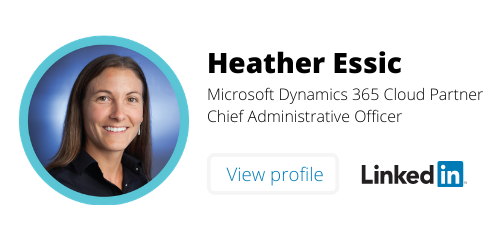
Can your systems keep your brand’s promises?
Legacy system woes can hold your brand back
As the Chief Administrative Officer for Sunrise Technologies, Heather Essic is responsible for overseeing Sunrise operations, including finance, marketing, and pre-sales. Prior to being named the Chief Administrative Officer, Heather was Sunrise's Director of Business Development for Existing Customers, leading extensive sales cycles for Microsoft Dynamics 365 and consulting.
Trust. It’s hard to gain, and easy to lose. And for brands, consumer trust is essential for growth. One of the most challenging parts of growing a company is maintaining your brand’s reputation while expanding into new products, channels, and regions. You may be thinking about different expansion strategies. But have you considered all the ways in which your legacy systems might be affected?
What is a brand promise?
Different expansion strategies
How branching out can affect legacy systems
How a global platform supports your brand
Frequently asked questions
What is a brand promise?
A brand promise is the experience or product your customers can expect to receive every time they interact with your company. Customers need to know you, like you, and then trust you. A person’s connection to a brand is built on trust.
Different expansion strategies
There are three paths companies typically follow as they begin to grow:
- Products: As a brand becomes more popular, it may branch out into new product categories. For example, a fashion brand may start selling accessories, then handbags, then shoes.
- Sales channels: Next, that same brand might open brick and mortar retail stores. Conversely, it might start selling online.
- Locations: Finally, this brand is ready to sell products in new regions or countries. Many companies start by using distributors in other countries before opening international offices or stores.
How branching out can affect legacy systems
The biggest challenge, whether you’re opening your first retail store or your first international office, is keeping the brand promise. The biggest mistake we’ve seen companies make during one of these expansions is installing a legacy business application that serves one strategy but not another.
Let’s say you are an apparel company selling to wholesalers in the U.S. — there are plenty of low-cost apparel management systems for your industry. But that type of system will buckle if you try to expand into new channels, markets, or products.
Or maybe you’re a catalog retailer, branching out into wholesale. Can your current systems handle those types of business processes, like B2B accounts receivables, net terms, cash discounts, or chargebacks?
We’ve heard this story many times: a growing brand chooses a business system (or a few legacy applications) for the business they have right now, but not for the future. Then, as the company grows, their legacy systems are strained. The results are poor customer experience, inventory problems, and other nightmares that frustrate customers and erode their trust. As the brand promise falters, eventually so does the brand.
How a single global platform supports your brand’s promise
Don’t be shortsighted when you select an ERP system. The best thing you can do while you’re still a growing brand is choose a business application that can support different products, sales channels, and regions. A global platform, running on a single database can handle these kinds of processes from the beginning.
Frequently asked questions
They are. But customizing your business applications is a short-term solution. They won’t support your company in the long run.
The ERP industry has evolved over the last few years, especially with the ubiquity of cloud computing. Systems like Dynamics 365 are built for multi-dimensional, global businesses.
You can definitely use a global system like Dynamics 365 with industry-specific solutions. Our customers use Sunrise 365 Supply Chain and Retail Replenishment solutions to get specific inventory, supply chain, and retail functions for their businesses, without customizing their core ERP software code.



